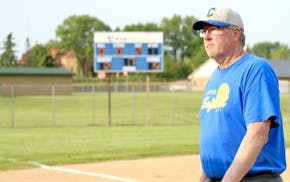A Waverly dairy farmer can be awarded damages because stray electrical currents from the local power cooperative killed some of his cows and caused others to produce less milk.
Harlan Poppler, 36, who for years struggled to determine what was wrong with his cows before making the link to stray voltage, said he felt vindicated by Monday's Appeals Court ruling.
"They were killing these cows and putting them under stress and I had to sit here and watch that every day," said Poppler, who runs the dairy farm with his wife, Jennifer, and father-in-law, Roy Marschall. "Do you have a pet? These cows are more than just a production animal to us. These cows are our livelihood."
In a split ruling, the court upheld a Wright County jury's verdict that the Popplers were entitled to damages from Wright-Hennepin Cooperative Electric Association for harm caused to their herd from the electricity. It was being conducted through the ground rather than a neutral wire connected through the farm, affecting the Popplers' 200-head herd. However, the case must return to Wright County to more specifically calculate the Popplers' estimated $700,000 loss in profits.
The case is one of many "stray voltage" cases that have circulated through Midwestern courts since the 1980s. Stray voltage is a phenomenon that can affect cows when electricity, which leaves a substation, uses the path of least resistance when it returns to its complete circuit.
In this case, the electricity was returning through the ground rather than a neutral line, and was conducting through the cows when they were in contact with metal devices such as stalls, feeders or milkers. In essence, the current used the cows as a pathway back to the substation.
In the same ruling, the Appeals Court ruled that the Popplers could not be awarded "trespassing" damages for the electricity that circulated through the ground in his property. The court ruled that the electricity circling back through the property "isn't the same as having someone go walk onto your property," said Scott Kelly, attorney for the electric cooperative. The Popplers' case marked the first time the trespassing issue went before a jury. In previous cases, judges dismissed it, he said.
"It's a victory, but there's still some things we have concern about," Kelly said. "The thing that troubles us is there's a lot of science out there on stray voltage, and the levels that can cause herd health issues. Our concern is that we follow science and what the researchers have found as opposed to emotion."
Poppler attorney David Sienko also cited the trespassing ruling as significant, but for different reasons.
"What it's doing is giving a public utility to allow unfettered levels of electric current to go through property of landowners without compensation," he said. Sienko added they're still discussing whether to appeal the trespassing ruling to the Minnesota Supreme Court, but that "it's certainly a very good possibility."
Problems in the herd
It was late 2007 when the Popplers noticed a decrease in the herd's milk production and an increase in their health problems. A veterinarian, nutritionist and others hired by Poppler ruled out issues with diet, water quality, overcrowding and other issues. Harlan Poppler then began to consider stray voltage as a possible cause.
Wright-Hennepin determined that no stray voltage problem existed, or if it did, it was from defective electrical wiring in Poppler's buildings rather than in the company's distribution lines. Poppler rewired but problems continued, and a consultant urged further improvements to the electrical system so that the currents didn't pass through the dairy farm on the way to the substation.
A second Wright-Hennepin consultant said the company's neutral line serving the dairy farm may be too small. After improvements by the electric coop to reroute the electricity, the herd's milk production and health improved.
The Popplers sued Wright-Hennepin and, after a March 2012 trial, the jury found the company liable for negligence, trespass and nuisance, while a judge ordered the company to replace the power line serving the Popplers' family farm.
Wright-Hennepin appealed on multiple grounds, including that the Popplers failed to prove that the herd's exposure to electricity was enough to cause harm, or that the stray voltage was the cause of their health problems.
Both sides have 30 days to petition the Minnesota Supreme Court to hear the case.
Abby Simons • 612-673-4921

This St. Paul native now goes by Kandi Krush, and she body-slams her opponents in the ring
Brooklyn Park City Council member censured for 2nd time
Man agrees to 6-year sentence for fatally shooting Hopkins man on edge of downtown Minneapolis

